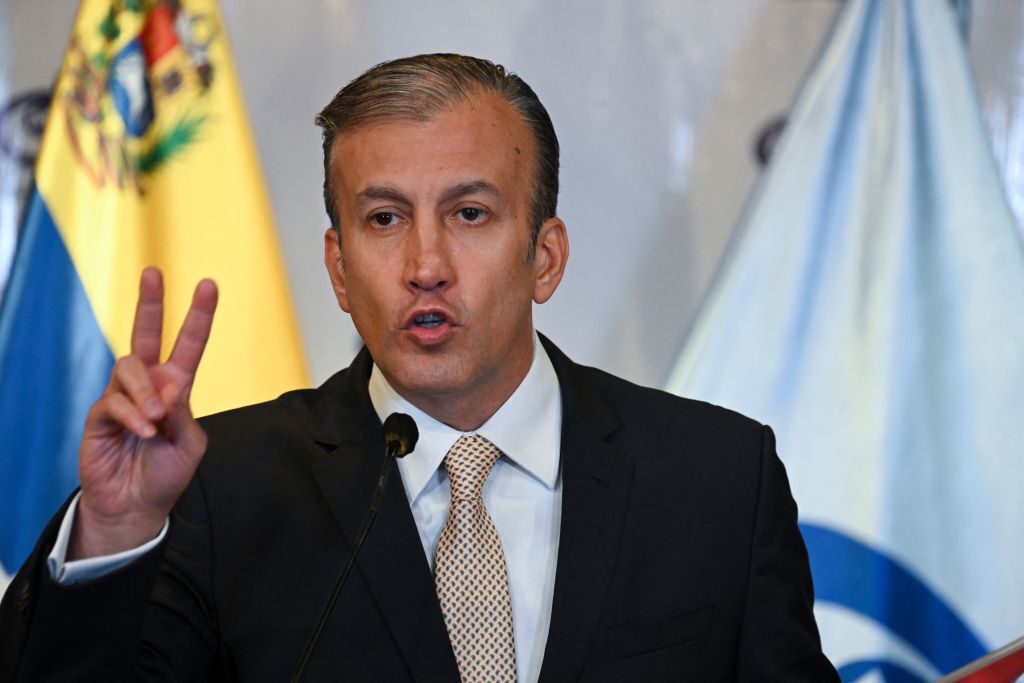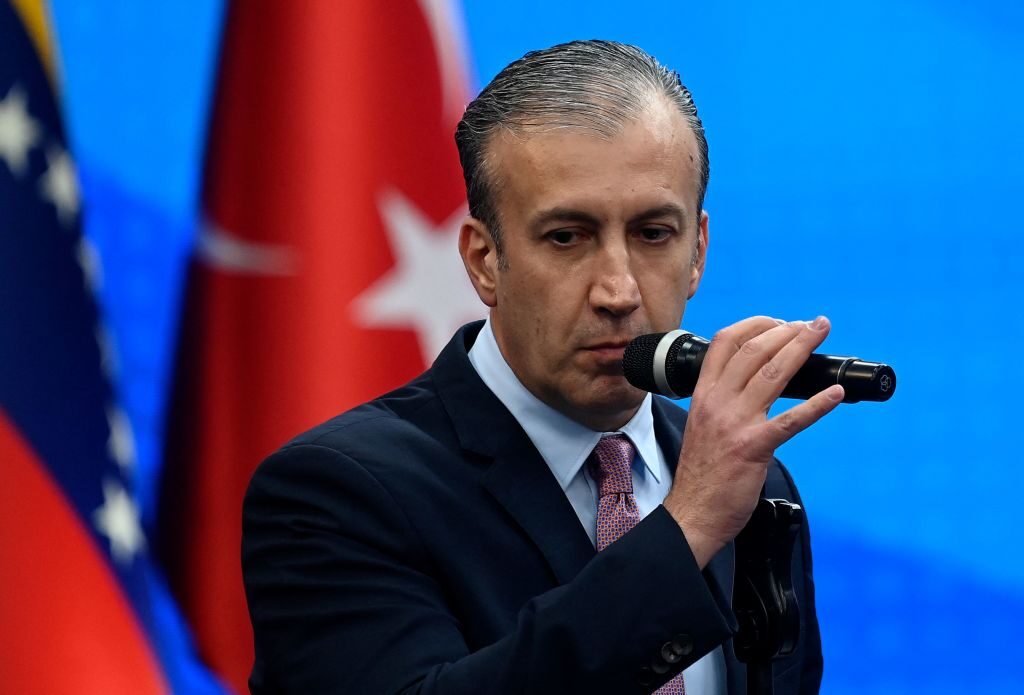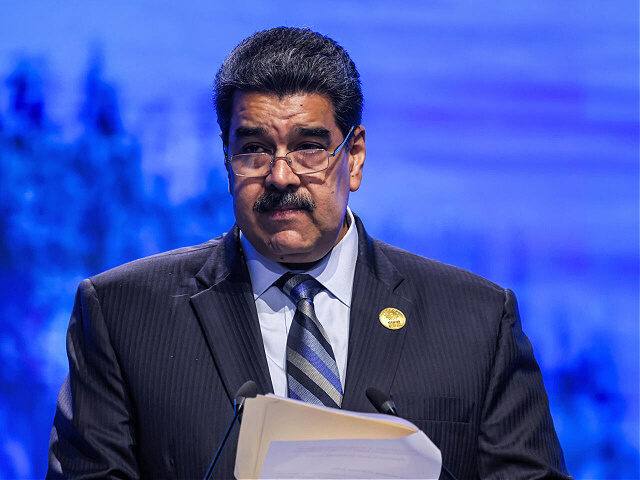CARACAS, Venezuela – Tareck El Aissami, one of the socialist regime’s most powerful figureheads, resigned from his position as the country’s oil minister on Monday.
El Aissami’s department followed the launch of a corruption probe in the state-owned Petróleos de Venezuela (PDVSA) oil company that has seen the arrest of an undetermined amount of regime officials, including some of his key allies.
“By virtue of the investigations that have been initiated into serious acts of corruption in PDVSA, I have made the decision to resign as minister of petroleum, in order to fully support, accompany and back this process,” El Aissami announced on Monday.
“Likewise, in my condition as a revolutionary militant, I place myself at the disposal of the [Venezuelan Socialist Party] leadership to support this crusade that has been undertaken by President Nicolàs Maduro against the anti-values that we are obliged to fight, even with our lives,” he continued.
El Aissami, who has held several different high-ranking positions in Venezuela’s socialist regime throughout the years, had taken the reins of the nation’s oil ministry in 2020. The former oil minister is long believed to hold close ties with the terrorist organization Hezbollah, facilitating relations between the socialist regime and the Shiite jihadists. In 2017, during the time El Aissami served as the Maduro regime’s interior minister, reports indicated that the Maduro regime had been selling Venezuelan passports to Hezbollah members.
U.S. authorities have accused El Aissami of being a drug kingpin, identifying him as a specially designated narcotics trafficker and imposing sanctions on him in 2017. Since 2020, The United States has offered a $10 million bounty for any information that can lead to his arrest and/or conviction.

Venezuelan Minister of Industries and National Production, Tareck El Aissami, speaks during a press conference after filing a corruption complaint with the attorney general’s office involving a “mega fraud” at the state oil company PDVSA, at the Public Ministry in Caracas on August 30, 2022. (YURI CORTEZ/AFP via Getty Images)
El Aissami denied all accusations through a public letter to the U.S. Department of Treasury that was published in a full-page ad in The New York Times in February 2017.
Socialist dictator Nicolás Maduro announced on Monday evening that he had accepted El Aissami’s resignation during an official event of the ruling United Socialist Party of Venezuela (PSUV).
“Tareck El Aissami has informed me of his resignation as minister of oil and [of] his willingness, as he has shown, to provide all the information he has and to support all the investigations against these groups of bandits and mafiosi,” Maduro said during the PSUV event, which was broadcast by the regime’s media networks. “I have decided to accept his resignation to facilitate all the investigations that must result in the punishment of the guilty parties.”
Maduro, whose socialist regime has turned Venezuela into the most corrupt country in the Americas, launched an “anti-corruption” probe over the weekend, arresting an undisclosed number of government officials. Diosdado Cabello, PSUV vice president and alleged drug lord, asserted on Monday that the number of detainees is in the “hundreds.”
The “anti-corruption” crackdown saw the arrest of several key allies of El Aissami’s through the weekend.
Among those arrested was Joselit Ramírez Camacho, considered El Aissami’s right-hand man. Since 2018, Ramírez Camacho served as the head of SUNACRIP, the socialist regime’s National Superintendence of Crypto Assets. The Maduro regime is accusing Ramírez Camacho of being involved in the disappearance of $3 billion in oil revenue from Venezuelan state coffers. The transactions involving the missing $3 billion were allegedly conducted through the regime’s scam cryptocurrency, the “petro,” as a way to circumvent U.S. sanctions on Venezuelan oil.
U.S. authorities have accused Ramírez Camacho of helping Maduro regime officials violate and evade sanctions imposed by the Office of Foreign Assets Control (OFAC). Similarly, he is accused of conspiring with others to launder money via bulk cash smuggling from Caracas to New York.
The Department of State is offering $5 million for information that can lead to the arrest and/or conviction of Joselit Ramírez Camacho.
Heriberto Perdomo, often identified as El Aissami’s front man, was also arrested on Sunday. At the time of his arrest, Perdomo – who owns several office buildings in the Las Mercedes commercial district of Caracas, including a Ferrari dealership – was found with $36 million in cash in his home.

Venezuela’s vice president of Economy Tareck El Aissami delivers a speech during the Venezuela-Turkey binational meeting with the participation of businessmen from both countries at the Miraflores presidential palace in Caracas, on January 24, 2023. (YURI CORTEZ/AFP via Getty Images)
Socialist lawmaker and former Minister of University Education Hugbel Roa, another man close to El Aissami, was also arrested over the weekend. Roa is accused of being involved in cases of embezzlement of PDVSA funds and for his alleged links to a network of prostitution of young girls.
As reported by the Financial Times on Monday, some observers believe that the Maduro regime’s corruption probe is part of a politically motivated purge in anticipation of scheduled sham elections next year.
Argentine news website Infobae reported on Friday that, according to Venezuelan journalist Ibéyise Pacheco, the purge of government officials is due to “the outbreak of an internal struggle” between El Aissami and siblings Delcy and Jorge Rodríguez, Maduro’s vice president and the head of the National Assembly, respectively. Like El Aisammi, both Rodríguez siblings have held different high-ranking positions in the Venezuelan socialist regime.
Given its status as one of the world’s most corrupt governments, it is close to impossible to determine the total amount of economic loss that Venezuela has suffered under the auspices of the socialist Maduro regime.
Reports published in 2021 indicated that by that time, it was estimated that the socialist regime’s corruption alone had caused Venezuela to suffer losses ranging between $300-$500 billion throughout its more than two decades of rule.
Christian K. Caruzo is a Venezuelan writer and documents life under socialism. You can follow him on Twitter here.

COMMENTS
Please let us know if you're having issues with commenting.